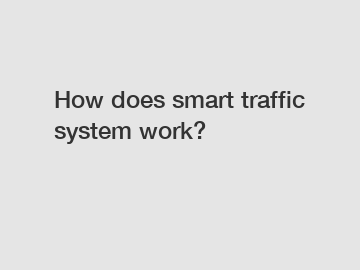How does smart traffic system work?
How Does Smart Traffic System Work?
In today's fast-paced world, traffic management has become a significant concern for both individuals and governments. Traffic congestion not only leads to wasted time and fuel but also affects the environment. To address this issue, smart traffic systems have been introduced to facilitate an efficient flow of vehicles on the road. These systems employ various technologies to monitor and regulate traffic patterns, optimize signal timings, and improve overall traffic management. In this article, we will delve into how smart traffic systems work and the benefits they provide.
Data Collection and Analysis:

Smart traffic systems rely on a plethora of data collection techniques to gather information about traffic flow and patterns. This includes the installation of sensors and cameras at critical points, such as intersections and highways, to monitor the volume and speed of vehicles. The collected data is then analyzed using algorithms and machine learning techniques to identify traffic patterns, peak hours, and congestion-prone areas. This analysis helps traffic managers make informed decisions and implement effective strategies to alleviate traffic congestion.
Traffic Signal Optimization:
One of the key components of a smart traffic system is the optimization of traffic signals. By using real-time data, these systems adjust the signal timings to match the current traffic conditions. This means that signals can be modified based on the number of vehicles waiting at an intersection, the arrival rate of vehicles from different directions, and the overall traffic density. By dynamically adapting the timings, smart traffic systems can significantly reduce waiting times, minimize congestion, and improve the traffic flow in a particular area.
Adaptive Traffic Control:
Another important feature of smart traffic systems is adaptive traffic control. Unlike traditional traffic lights that operate on predetermined timings, adaptive traffic control systems constantly adapt to the changing traffic conditions. These systems make use of artificial intelligence and advanced algorithms to evaluate real-time data, predict traffic patterns, and optimize signal timings accordingly. Adaptive traffic control ensures a more efficient allocation of green signal times, reducing congestion and travel time for commuters.
Intelligent Traffic Management:
Smart traffic systems also incorporate intelligent traffic management tools to further enhance the overall traffic flow. These tools provide traffic managers with real-time information about accidents, road works, and other incidents that might affect traffic. By receiving instant alerts, the authorities can take necessary actions promptly, such as rerouting traffic or dispatching emergency services. Moreover, intelligent traffic management systems can communicate directly with vehicles equipped with smart technologies, providing them with information about road conditions, alternative routes, and estimated travel times, leading to safer and more efficient journeys.
Benefits of Smart Traffic Systems:
The integration of smart traffic systems in urban environments offers numerous benefits. Firstly, it reduces traffic congestion, leading to faster and more reliable travel times for road users. Secondly, by optimizing signal timings, these systems minimize fuel consumption and emissions, promoting sustainability. Additionally, smart traffic systems enhance road safety by providing real-time information and effectively managing incidents. Moreover, by improving the traffic flow, smart traffic systems positively impact the overall economy by reducing transportation costs and increasing productivity.
Conclusion:
In conclusion, smart traffic systems are transforming the way we manage traffic in our cities. Through data collection, analysis, traffic signal optimization, adaptive control, and intelligent management, these systems offer numerous benefits to road users and governments alike. By efficiently regulating traffic flow, these systems bring about smoother and safer journeys, reduced congestion, and improved overall traffic management. The integration of smart traffic systems is a crucial step towards building smarter and more sustainable cities.
Contact us:
If you want more information or assistance regarding smart traffic systems and their implementation, please do not hesitate to contact us. Our team of experts is ready to answer your queries and provide the guidance you require.
If you want to learn more, please visit our website countdown traffic light, customized variable message panels, chainzone led display Manufacturer.

Comments